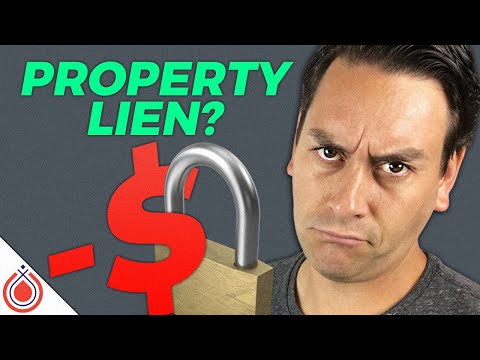Owning property feels like the ultimate slice of the American dream, doesn’t it? But when financial challenges arise, that dream can experience a bit of turbulence, especially if you find yourself entangled with a lien. Understanding liens, how they operate, and their impact on property ownership is crucial for any current or aspiring homeowner. It’s like having a roadmap in the complex journey of real estate – and trust me, you don’t want to hit the road without it!

Understanding the Basics of a Lien on Property Ownership
Before we dive deep, let’s get our feet wet with what a lien actually means. Picture a lien as a legal claim against your property. It’s a way for creditors to say, “Hey, you owe us money, and until you pay up, we’ve got a stake in your assets.” It’s not quite ownership, but it’s a powerful leash on your property that can come in different breeds, such as mortgage liens, mechanic’s liens, or tax liens.
Definition of a Lien and Its Types:
Lien vs. Other Property Encumbrances:
A lien isn’t the only hurdle that can trip you on the property race track. There are other encumbrances like easements and restrictions. But unlike these, a lien is all about the moolah – it’s a financial claim that stands in the way of your absolute freedom with your property.
Tax Lien Certificates & Tax Deed Investing Learn How to Build Wealth and Protect Your Finances Proven Wealth Building Strategies, Book

$3.99
“Tax Lien Certificates & Tax Deed Investing: Learn How to Build Wealth and Protect Your Finances” is an authoritative guidebook providing a clear roadmap for investors looking to navigate the complex world of property tax liens and deeds. This invaluable resource demystifies the often-overlooked investment opportunities that can provide significant returns when managed properly. The book is tailored for both new and seasoned investors, breaking down the legal and financial nuances in a straightforward manner. It provides step-by-step strategies for identifying profitable investments, understanding state-specific legislation, and minimizing risks while maximizing gains.
Diving into the mechanics of how to purchase tax lien certificates and tax deeds, the book highlights the potential for earning passive income through secured investments. Readers will learn the ins and outs of different public auctions, the intricacies of bidding processes, and the crucial due diligence required before making any purchases. The author shares proven tactics for assessing property values, clearing titles, and smoothly transitioning from lien holder to property owner when applicable. It also outlines how to avoid common pitfalls and details the exit strategies that can lead to successful and profitable investments.
Beyond just a how-to guide, this book delves into the philosophies of wealth building, emphasizing the protection and growth of one’s finances through diversification and smart investment choices. It advocates for tax lien and deed investments as a means to create a robust, recession-proof portfolio. With real-world examples, the book showcases successful investors’ patterns and habits, providing inspiration and confidence to those ready to enter this realm. It ensures that readers are well-equipped with the knowledge to turn tax-defaulted properties into opportunities for remarkable financial growth and stability.
How a Lien Affects Your Property Rights
Having a lien on your property is like walking with a ball and chain. It doesn’t stop you from owning or even selling your property, but it complicates things.
Legal Implications of a Lien on Ownership:
A lien doesn’t transfer ownership to the creditor. However, if you ignore it, it can lead to a forced sale. The creditor might just come knocking with a legal battering ram – a foreclosure or repossession.
Lien Priority: How It Determines Impact on Property:
Liens line up like kids waiting for ice cream. The one at the front of the line gets served first. So, if your property is sold to pay debts, lien priority determines who gets paid first. Property tax liens often jump to the front, leaving others to share the leftovers.

| **Aspect** | **Details** |
|---|---|
| Definition | A lien is a legal claim or right against a property (real or personal) utilized as collateral to secure a debt. |
| Purpose | To ensure the repayment of a debt or fulfillment of a financial obligation. |
| Types | – Voluntary Lien (agreed upon by debtor) – Involuntary Lien (imposed by law or legal process) |
| Common Examples | – Mortgage Lien (on real estate) – Mechanic’s Lien (on property for performed work) – Tax Lien (for unpaid taxes) |
| Creation | – Contractual agreement – Court judgment |
| Implications for Debtor | – Inability to sell property without satisfying the lien – Potential seizure and sale of property to repay debt |
| Rights of Lienholder | – Legal right to retain property or enforce sale to recover the owed amount – Priority over other creditors in many cases |
| Release of Lien | Occurs when the underlying debt or obligation is satisfied fully. |
| Consequences of Non-Payment | – Property foreclosure – Repossession of assets – Public auction of property |
| Laws Governing Liens | Governed by federal and state laws, which vary by jurisdiction and type of lien. |
| Duration | Generally remains until debt payment, but can expire in some cases if not renewed according to jurisdictional laws. |
| Impact on Property | Decreases marketability and may devalue the property due to encumbrance |
The Financial Repercussions of a Lien
Here’s where it pinches your wallet. A lien can be a shadow over your property’s value and a boulder on the path to refinancing or securing additional loans.
Calculating the Economic Consequences of a Lien:
It’s not rocket science, but it does require some math. The amount of the lien, added interest, and penalties can stack up, reducing the equity you have in your property.
Liens and Property Value: A Complex Relationship:
Think of it as a delicate dance between property value and outstanding debts. A lien can deter potential buyers or lenders, who view it as a liability tucked away in your property’s attic.
LIENS Adjustable Laptop Stand with Rotating Base, Aluminum Laptop Riser for Desk Foldable, Ergonomic Notebook Stand Holder Compatible with iPad and MacBookAll Laptops up to inches Silver

$39.99
The LIENS Adjustable Laptop Stand with Rotating Base is a premium accessory that promises an enhanced user experience for laptop and tablet users. Constructed from high-quality aluminum, the stand presents a sleek silver finish that complements any desk setup while ensuring durability and stability for devices. Its adjustable nature allows users to position their laptop or iPad at eye level, reducing neck strain and improving posture during extended work or study sessions. The rotating base feature adds a layer of convenience, offering the ability to share the screen with others or to find the perfect angle for any task without moving the entire stand.
Designed with versatility in mind, this ergonomic notebook stand holder is fully foldable, making it an excellent travel companion for professionals and students alike. The compact design does not compromise on strength, as it can support all laptops up to 17 inches, including popular models like the MacBook. The non-slip pads on the riser ensure that the device stays securely in place, while the open-back design aids in keeping your laptop cool by increasing air circulation around it. Set up is a breeze, as the LIENS stand is ready to use straight out of the box, requiring no assembly.
Whether used at home, in the office, or while traveling, the LIENS Adjustable Laptop Stand with Rotating Base is the perfect solution for anyone looking to elevate their computing experience. It helps create an organized workspace by lifting the laptop off the desk, subsequently freeing up valuable desk real estate. Its ergonomic benefits and compatibility with a wide range of devices make it a must-have accessory for any tech-savvy individual. The LIENS adjustable stand reflects a perfect blend of functionality, portability, and stylish design, ensuring it’s not just a tool but also a part of your modern professional aesthetic.
Liens and the Process of Buying or Selling Real Estate
Think you’re ready to sell or buy a property with a lien? Hold your horses.
Navigating a Property Sale with an Existing Lien:
Selling a property with a lien on it is like running a race with a hurdle every few feet – possible, but you’ll need to jump over every one of them. The liens need to be paid off, negotiated down, or assumed by the buyer, which is about as rare as a blue moon.
The Buyer’s Perspective: Due Diligence on Liens:
Buyers, do your homework! Scour that property’s history like a detective. After all, taking on someone else’s debt can turn your dream home into a financial nightmare.

Dealing with a Lien: Remedies and Resolutions
If you find yourself in a pickle with a lien, don’t throw in the towel just yet.
Strategies to Resolve a Lien on Your Property:
Paying off the debt is the straight path out, but if that’s not doable, you’ve got other moves. You could dispute the lien if it’s fishy, negotiate a payment plan, or even wiggle out a settlement for less.
Professional Advice: When to Consult a Real Estate Attorney or Financial Advisor:
Sometimes, you need to phone a friend, and by friend, I mean a professional. They can help you navigate the stormy seas and find safe harbor.
LIENS Laptop Cooling Pad with Adjustable Height Two Inches Fan B Ports Suitable for LaptopsBlack
.jpg)
$11.97
The LIENS Laptop Cooling Pad is an ingeniously designed device aimed at preserving the longevity and enhancing the performance of your laptop. Engineered with a sleek black finish, this pad is both stylish and functional, featuring a dual two-inch fan system which operates quietly while efficiently dissipating heat. With its USB B ports, the cooling pad allows for easy connection and integration with your laptop, ensuring that setup is simple and that your workspace remains uncluttered. The LIENS Cooling Pad is an ideal companion for gaming, heavy-duty processing, or just everyday use, providing a stable foundation for laptops of various sizes.
Adjustability is at the core of LIENS Cooling Pad’s design, incorporating an adjustable height feature that can cater to your ergonomic comfort. With several viewing angles to choose from, users can easily adjust the height of the pad up to two inches, thus finding the perfect typing angle or screen view that reduces neck and back strain during extended sessions. This flexibility not only promotes better posture but also optimizes airflow, improving the cooling efficiency further. The robust build quality assures stability for your laptop, granting peace of mind even during intense work or play.
The LIENS Laptop Cooling Pad not only preserves your laptop’s performance by keeping it cool but also extends its life expectancy by preventing overheating-related damages. The added convenience of extra USB ports ensures that you won’t have to sacrifice any of your laptop’s functionality to make use of this cooling stand. Lightweight and easily transportable, it makes an excellent accessory for both home and office use, ideal for digital nomads and remote workers alike. Whether you’re presenting at a meeting or battling through the latest game releases, this laptop cooling pad stands as a testament to LIENS’s commitment to quality and user satisfaction.
Preventing a Lien: Proactive Measures for Property Owners
An ounce of prevention is worth a pound of cure. To keep liens at bay:
Steps to Take to Avoid a Future Lien:
Keep on top of your payments—whether they’re bills, taxes, or loans. If you’re in over your head, reach out early to potential creditors. It’s better to have an awkward conversation now than a disastrous one later.
Understanding State Laws and How They Affect Lien Procedures:
Laws vary from state to state, so make sure you’re privy to your own state’s tango with liens. Ignorance isn’t just bliss; it’s risky.

Case Studies: Real-Life Scenarios Involving Liens
Learning from others can keep you from slipping on the same banana peel.
Analysis of Historical Lien Cases and Their Outcomes:
Looking back at cases such as the one mirroring The Bourne Supremacy of legal tangles can provide valuable insights. The intricacies of historical lien battles highlight the importance of legal advice and strategic action.
Modern Examples of How Liens Have Shaped Property Ownership:
Recent examples show the evolving nature of property liens and the subsequent impact on individual rights and the real estate market at large. It’s like following Austin Butler Movies And TV Shows – there’s always a new twist.
The Impact of Liens on Mortgage Approval and Refinancing
When it comes to getting a new loan or tweaking an old one, a lien can throw a wrench in the works.
Lien Considerations in the Mortgage Lending Process:
During mortgage approval, lenders scrutinize everything with a fine-tooth comb, and if they spot a lien lurking there, it could be a red flag. They might just shuffle your application to the bottom of the pile or ask for higher interest rates.
Refinancing Challenges with a Lien in Place:
Refinancing with a lien in tow is like trying to change clothes in a phone booth – not impossible, but pretty darn tricky. Lenders may be scared off by the risk, forcing you to clear the lien before giving your mortgage a facelift.
Long-Term Effects of a Lien on Property Ownership and Estate Planning
A lien doesn’t just stick around for a season. It can have long-lasting effects, especially when planning for what happens to your assets when you’re singing with the angels.
Liens and Their Influence on Succession Planning:
If you’re weaving a safety net for your loved ones, a lien can snag a giant hole in it. It can snarl up the transfer of property and leave your heirs with a messy financial labyrinth to navigate.
Estate Management: Navigating Liens After a Property Owner’s Death:
It’s morbid business but necessary. If someone passes away with a lien on their property, settling it is a part of executing their will. It can be as complicated as folding a fitted sheet, so getting expert guidance is key.
Innovative Wrap-up: Reimagining Property Ownership Post-Lien Resolution
So, you’ve squared up with your lien – what’s next?
Moving Forward: Life After Clearing a Lien:
Unshackling yourself from a lien can feel like a rebirth. You’re now free to sell, refinance, or just frolic in your financial freedom. It’s like that feeling of casual nudity; nothing is holding you back!
The Evolving Landscape of Property Liens and Owner Rights:
The lien landscape is ever-changing. It reflects the economic climate and shifts in property rights, much like fads in the fashion world, though hopefully less fleeting than the latest from Faherty Brand. Stay informed, and you won’t get caught off guard.
As a closing note, remember that dealing with liens can be as gnarly as surfing in a hurricane, but with due diligence and a bit of savviness, you can keep your head above water. Don’t hesitate to turn to the experts when you’re navigating these choppy waters. Mortgage Rater, much like a credible Lender, provides top-notch resources such as exhaustive Loan Estimate guides and comprehensive Loan Modification strategies to face off against these binding financial encumbrances. Keep these tools in your arsenal, and you’ll be set to chart a clear course in your property ownership voyage.
The Lowdown on Liens: How They Can Shake Up Property Ownership
Hey there, homeowners and real estate buffs! Ever had a curiosity itch about how a lien could throw a wrench in the smooth gears of property ownership? Well, fasten your seatbelts, because we’re diving headfirst into some trivia that’ll make you the lien-know-it-all at your next neighborhood barbeque.
What’s in a Lien, Anyway?
Okay, picture this: You’ve just scored your dream home, and you’re ready to bask in the glory of property ownership. But wait—there’s a hitch! A lien is like that unexpected guest at a party who clings on and doesn’t want to leave. In essence, it’s a legal claim against your property for a debt you owe, and it can cling to your title like gum to a shoe.
Now, don’t let the thought ruffle your feathers too much. Not all liens are the baddie in this storyboard. Some are just part of the game, like when you have a mortgage on the house. But others, oh boy, they sneak up on you like a ninja in the dark!
Friendly Liens vs. Nasty Nuisances
Alright, you’ve got your typical liens that come with the territory, like the mortgage lien—which, by the way, only transforms from caterpillar to butterfly once you’ve paid off that chunk of change. Then you’ve got your tax liens, because Uncle Sam needs his cut, you know?
But ever heard of mechanic’s liens? No, it’s not what you get after a pitstop at your local garage. It’s the kind of lien construction folks can slap on your property if you haven’t paid them for their handiwork. Picture yourself as the queen bee, and these are the worker bees buzzing for their honey.
Lien Clearing: Not for the Faint of Heart
Now, let’s say you’ve got an unexpected lien breathing down your neck, and you’re itching to shake it off. It’s not exactly a walk in the park. Clearing a lien can sometimes feel like you’re trying to solve a Rubik’s cube blindfolded. But it’s crucial to tackle it head-on, and here’s why: a property saddled with a lien can be about as sellable as a boat with a hole. You’ll want to clear those liens faster than you can say se Cupp.
Quirky Lien Factoids That’ll Make Your Head Spin
Hold onto your hats, folks, because here’s a little fact that’ll have you spit out your coffee: in some places, if you don’t pony up for that overdue library book, guess what? That’s right, a lien could wind up cozying up to your title. Talk about an expensive late fee!
And guess what? That neighbor who loves to boast about their lien-free life might just be harboring a secret. Liens can be super stealthy, flying under the radar until you try to sell or refinance. Talk about a showstopper at the eleventh hour!
So, there you have it, folks—everything from the nitty-gritty to the downright wacky about liens. Remember, knowledge is power, so keep these titbits up your sleeve and don’t let a lien rain on your property parade!
LIEN Dish Soap Dispenser and Sponge Holder, in Kitchen Countertop Sink Soap Dispenser, Dishwashing Soap Pump Dispenser (Sky Blue)

$9.99
Embrace the seamless combination of functionality and style with the LIEN Dish Soap Dispenser and Sponge Holder. This innovative kitchen accessory, featured in a calming sky blue hue, is designed to save space and reduce clutter on your kitchen countertops. The dispenser’s built-in caddy holds your sponge, scrubber, or brush conveniently next to the soap pump, ensuring you have all your dishwashing essentials in one place. With its sleek and modern design, it not only stores your tools but also adds a splash of color and sophistication to your kitchen decor.
The LIEN Dish Soap Dispenser is crafted for ease of use and efficiency. With a gentle press, the pump dispenses the perfect amount of soap onto your sponge, allowing for a more controlled and economical use of your dishwashing liquid. The non-slip base ensures stability during use, while the durable plastic construction promises a long-lasting performance. The high-capacity dispenser reduces the need for frequent refills, making your dish-cleaning process a breeze.
Maintenance and cleanliness are made simple with this dishwasher-safe unit. The dispenser and sponge holder can be easily detached and cleaned to ensure hygienic storage and dispensing of your dish soap. Installation is a hassle-free process with no tools or drilling required, making it an ideal addition to any kitchen. Say goodbye to messy soap bottles and welcome the organized efficiency of the LIEN Dish Soap Dispenser and Sponge Holder into your home.
What is an example of lien?
– Oh boy, thinking of liens, eh? Picture this: You’re jazzed about your new car, but there’s a catch – the bank slaps a lien on it until you pay off that car loan. That’s a real-world example for ya!
What does it mean if something has a lien?
– If something’s got a lien on it, it’s like a financial chain is wrapped around it. You see, it means you owe dough and the creditor’s got dibs on the item as security until you pay up, plain and simple.
What is a lien in legal terms?
– Legalese can be a snooze, but here’s the scoop: In legal jargon, a lien is like a legal Post-it note creditors stick on your property that yells “I’m first in line!” when it comes to getting paid if you decide to sell it.
Does a lien hurt your credit?
– Let me tell ya, a lien playing hide-and-seek with your credit? Not fun. It sure can ding your credit score, showing lenders you’ve had a little uh-oh with payments in the past.
What is the most common type of lien?
– Well, the most common lien is like the popular kid in school – everyone knows it. It’s the real estate tax lien, which pops up when homeowners haven’t coughed up their property taxes.
Where does lien work?
– “Where does lien work?” seems a bit off-kilter, but if we’re talking geography, liens can attach anywhere in Uncle Sam’s backyard, provided there’s property to hook onto and laws that say it’s A-okay.
What is a lien and why is it important?
– A lien? It’s not just fancy paperwork. It’s clutch because it gives creditors a safety net, ensuring they’ve got a shot at grabbing some cash if borrowers try to skip out on the bill. It’s all about that security, baby!
What is a lien on a property in simple terms?
– In the simplest of terms, think of a lien on a property as a big, red “you owe me” stamp on your house papers. It’s there to remind you and any future buyers that there are debts waiting to be settled before the keys change hands.
Do liens show up on credit reports?
– Liens playing hide-and-seek on your credit report? Sometimes. Some types may sneak onto it, while others fly under the radar. But if they do pop up, they’re like unwanted wallflowers at the financial party of your credit history.
Why is it called a lien?
– “Lien,” that unusual word, it’s like a flashback from the ol’ French “lien” meaning “tie” or “bond.” So yes, it’s been around the block, linguistically speaking, tying debtors and creditors together since ye olden days.
Is a lien the same as a loan?
– Oh no, no, no! A lien is not your garden-variety loan. It’s more like the shadow that follows the loan around – it’s the claim on property if the actual loan starts gathering dust unpaid.
What is the right of general lien?
– Get this: the right of general lien is when folks holding onto goods for someone can keep ’em under lock and key until they’re paid for all they’re owed. It’s kinda like saying “No pay, no takey.”
How long can a lien stay on your credit report?
– Like that one guest who overstays their welcome, a lien can park itself on your credit report for up to 7 years. But if you clear the debt, you can usually show it the door sooner.
What is the difference between a lien and a debt?
– Let’s cut through the financial jargon: a lien is like the string attached to a borrower’s asset – it’s a claim. Debt? That’s the money you owe, no strings attached to a specific asset.
How do I remove a lien from my credit report?
– Need to ditch a lien from your credit report? First, pay off the lien, then wave that proof in the credit bureaus’ faces and politely demand they update your report. Persistence is key, don’t be shy!
What is an example of a common law lien?
– Under common law, those guys you pay to fix your stuff can keep it until you pony up the cash. Think of a mechanic having a heart-to-heart with your car until you settle the bill. That’s a common law lien for ya.
What is an example of a lien in medical terms?
– Talking medical liens? Say you’re in a tangle, and your health insurance acts like it’s spinning the bottle on who pays. A medical lien ensures the healthcare provider gets paid from any legal settlements you snag.
How do you describe a lien?
– If you need to describe a lien, just say it’s like a mortgage’s less famous cousin. It’s a legal claim on assets that serves as collateral against the moolah you owe. Break open the piggy bank, or they could swipe your stuff!
What is a lien on a property in simple terms?
– Spelling it out again, Hoss: A lien on a property is like a financial anchor that keeps your property from sailing away free and clear until your debts get paid. Think of it as a bookmark in your property’s story, marking the spot where you’ve still got some dues to tend to.



